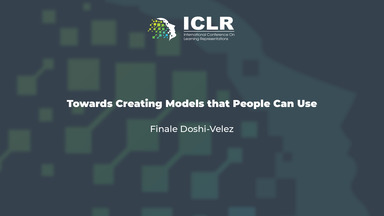Multi-timescale Representation Learning in LSTM Language Models
Mai 3, 2021
Sprecher:innen
Shivangi Mahto
Sprecher:in · 0 Follower:innen
Javier S. Turek
Sprecher:in · 0 Follower:innen
Alexander Huth
Sprecher:in · 0 Follower:innen
Über
Language models must capture statistical dependencies between words at timescales ranging from very short to very long. Earlier work has demonstrated that dependencies in natural language tend to decay with distance between words according to a power law. However, it is unclear how this knowledge can be used for analyzing or designing neural network language models. In this work, we derived a theory for how the memory gating mechanism in long short-term memory (LSTM) language models can capture power law decay. We found that unit timescales within an LSTM, which are determined by the forget gate bias, should follow an Inverse Gamma distribution. Experiments then showed that LSTM language models trained on natural English text learn to approximate this theoretical distribution. Further, we found that explicitly imposing the theoretical distribution upon the model during training yielded better language model perplexity overall, with particular improvements for predicting low-frequency (rare) words. Moreover, the explicit multi-timescale model selectively routes information about different types of words through units with different timescales, potentially improving model interpretability. These results demonstrate the importance of careful, theoretically-motivated analysis of memory and timescale in language models.Language models must capture statistical dependencies between words at timescales ranging from very short to very long. Earlier work has demonstrated that dependencies in natural language tend to decay with distance between words according to a power law. However, it is unclear how this knowledge can be used for analyzing or designing neural network language models. In this work, we derived a theory for how the memory gating mechanism in long short-term memory (LSTM) language models can capture…
Über ICLR 2021
The International Conference on Learning Representations (ICLR) is the premier gathering of professionals dedicated to the advancement of the branch of artificial intelligence called representation learning, but generally referred to as deep learning. ICLR is globally renowned for presenting and publishing cutting-edge research on all aspects of deep learning used in the fields of artificial intelligence, statistics and data science, as well as important application areas such as machine vision, computational biology, speech recognition, text understanding, gaming, and robotics.
Gefällt euch das Format? Vertraut auf SlidesLive, um euer nächstes Event festzuhalten!
Professionelle Aufzeichnung und Livestreaming – weltweit.
Freigeben
Empfohlene Videos
Präsentationen, deren Thema, Kategorie oder Sprecher:in ähnlich sind
Representing Partial Programs with Blended Abstract Semantics
Später ansehen
Maxwell Nye, …
Voice2Series: Reprogramming Acoustic Models for Time Series Classification
Später ansehen
Huck Yang, …
One Network Fits All? Modular versus Monolithic Task Formulations in Neural Networks
Später ansehen
Oral Session 12 - QA 1
Später ansehen
Colin Wei, …





